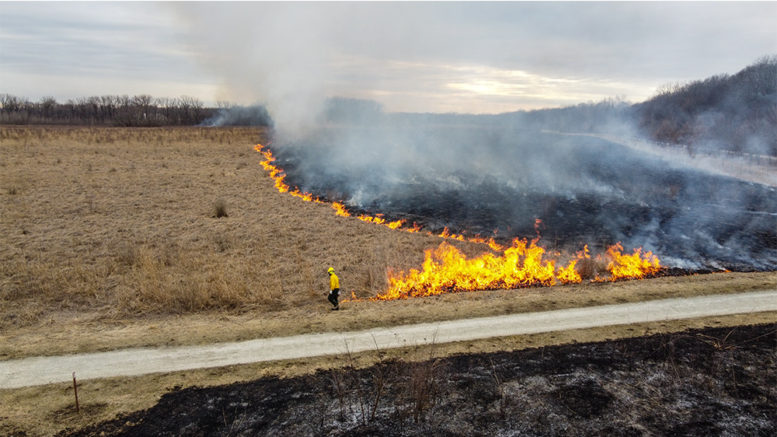On March 3, Hamilton County Parks performed a controlled prairie burn on the south side of Strawtown Koteewi Park, the county’s largest park, which has more than 300 acres of protected and maintained native prairie.
During the prescribed burn, a necessary land management practice, the trails in that area of the park were closed and access to Koteewi Lake and Koteewi Aerial Adventures was restricted to ensure public safety.
After the successful completion of the burn, which was strategically coordinated by specialists in the field, the prairie appeared charred and damaged. However, park officials were quick to note that such burns are actually beneficial and part of the ongoing maintenance of the park’s prairie system.
Burns kill non-prairie and shallow-rooted invasive plant species, allowing for increased growth of native prairie plants, which have deeper roots, unaffected by the heat of the burn. Left unchecked, trees and shrubs gradually move in and “choke out” the prairie’s native grasses. This natural process is call succession. Controlled burns clear out the unwanted woody vegetation that shade and restrict the growth of prairie plants.
When in the park this spring visitors will notice the preferred native plant life becoming increasingly evident. In the meantime, staff at the Taylor Center of Natural History, located in Strawtown Koteewi Park, invite visits to their facility to learn even more about the benefits of controlled prairie burns and other responsible land management practices undertaken by Hamilton County Parks and Recreation.
To learn more about Strawtown Koteewi Park or Hamilton County Parks and Recreation, visit MyHamiltonCountyParks.com or call (317) 770-4400. Once posted on Hamilton County Parks’ Facebook page, dramatic aerial video of the Strawtown Koteewi Park controlled prairie burn will be available for viewing.
Photos courtesy Byron Settle, GIS/Visual Media Specialist, Hamilton County Plan Commission

